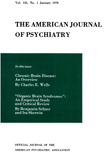The sequelae and nonsequelae of conjugal bereavement
Abstract
The author reviews prospective studies of bereavement, which show that widows and widowers suffer from significant depressive symptoms in the first year. Young widows and widowers may have more physical distress and take more drugs. There are few changes among older men and women in physical health, visits to physicians, and hospitalizations. Psychiatric consultation and hospitalization are rare and tend to occur early in a bereavement rather than later. There is probably an increase in mortality only among older widowers in the first year. The death of one's spouse is a psychologically stressful event; however, during the first year men and women cope with the loss with minimal morbidity and mortality.
Access content
To read the fulltext, please use one of the options below to sign in or purchase access.- Personal login
- Institutional Login
- Sign in via OpenAthens
- Register for access
-
Please login/register if you wish to pair your device and check access availability.
Not a subscriber?
PsychiatryOnline subscription options offer access to the DSM-5 library, books, journals, CME, and patient resources. This all-in-one virtual library provides psychiatrists and mental health professionals with key resources for diagnosis, treatment, research, and professional development.
Need more help? PsychiatryOnline Customer Service may be reached by emailing [email protected] or by calling 800-368-5777 (in the U.S.) or 703-907-7322 (outside the U.S.).



